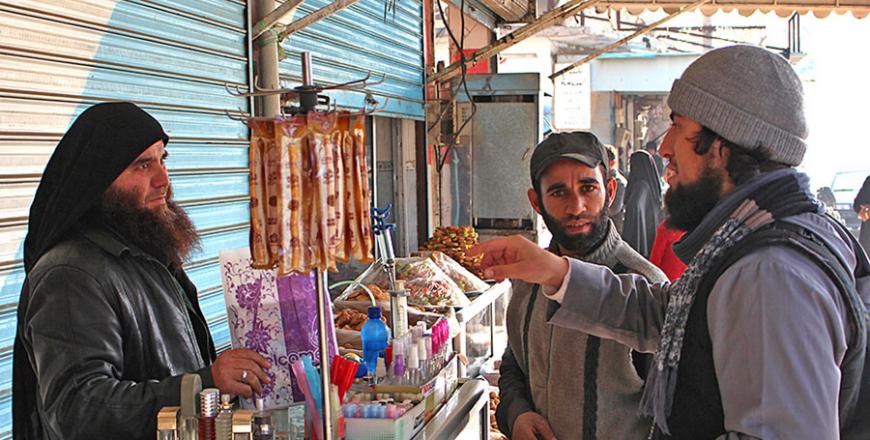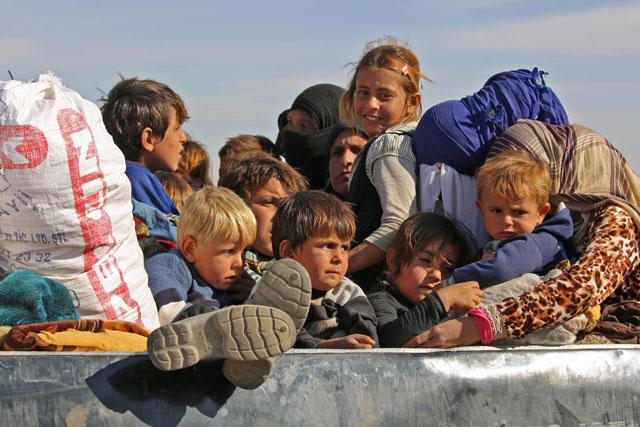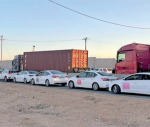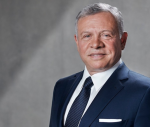You are here
For a Daesh fighter, a paid honeymoon in caliphate’s heart
By AP - May 26,2015 - Last updated at May 26,2015

In this photo released on April 1, by a militant website, which has been verified and is consistent with other AP reporting, a member of the Daesh group (right) speaks with a perfume street vendor (left) at a market in Raqqa, Syria (AP file photo)
BEIRUT — The honeymoon was a brief moment for love, away from the front lines of Syria's war. In the capital of the Daesh group's self-proclaimed "caliphate”, Syrian fighter Abu Bilal Al Homsi was united with his Tunisian bride for the first time after months chatting online. They married, then passed the days dining on grilled meats in Raqqa's restaurants, strolling along the Euphrates River and eating ice cream.
It was all made possible by the marriage bonus he received from the Daesh group: $1,500 for him and his wife to get started on a new home, a family — and a honeymoon.
"It has everything one would want for a wedding," Homsi said of Raqqa — a riverside provincial capital that in the 18 months since Daesh took control has seen militants beheading opponents and stoning alleged adulteresses in public. Gunmen at checkpoints scrutinise passersby for signs of anything they see as a violation of Shariah, or Islamic law, as slight as a hint of hair gel. In the homes of some of the Daesh commanders in the city are women and girls from the Yazidi religious sect, abducted in Iraq and now kept as sex slaves.
The Daesh group is notorious for the atrocities it committed as it overran much of Syria and neighbouring Iraq. But to its supporters, it is engaged in an ambitious project: Building a new nation ruled by what radicals see as "God's law”, made up of Muslims from around the world whose old nationalities have been erased and who have been united in the "caliphate”.
To do that, the group has set up a generous welfare system to help settle and create lives for the thousands of jihadists — men and women — who have flocked to Daesh territory from the Arab world, Europe, Central Asia and the United States.
"It is not just fighting," said Homsi, who uses a nom de guerre. "There are institutions.There are civilians [that Daesh] is in charge of, and wide territories. It must help the immigrants marry. These are the components of a state and it must look after its subjects." Homsi spoke in a series of interviews with the Associated Press by Skype, giving a rare look into the personal life of an Daesh jihadi.
The new Daesh elite is visible in Raqqa, the biggest city in Syria under the extremists' rule.
Luxury houses and apartments, which once belonged to officials from the government of Syrian President Bashar Assad, have been taken over by the new Daesh ruling class, according to a member of an anti-Daesh media collective in the city who goes by the name of Abu Ibrahim Al Raqqawi.
Raqqa, at the centre of Daesh-controlled territory, is cushioned from the fighting around its edges. Its supermarkets are well stocked and it boasts several internet cafés.
"The city is stable, has all the services and all that is needed. It is not like rural areas the group controls," Raqqawi said. "Raqqa is now the new New York" of the caliphate. Like others in his media collective, he uses a nickname for his security and doesn't specify his whereabouts.
Helping fighters marry is a key priority. Aside from the normal stipend, foreign fighters receive $500 when they marry to help them start a family. The 28-year-old Homsi got a particularly large bonus because his new wife is a doctor and speaks four languages.
Related Articles
BEIRUT — A Syrian Kurdish-led force fighting the Daesh terror group north of the country are on the verge of surrounding a wide area north o
BEIRUT — The Daesh group has been ousted from northwestern Syria's Idlib province after a final group of the extremists surrendered to hardl
BEIRUT — The Daesh terror group has executed more than 90 people, a third of them civilians, over the past month in areas of war-torn Syria

















